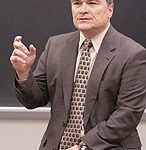Eric Barron, director of the Earth and Mineral Sciences Environment Institute at Pennsylvania State University, discussed the potential impacts of global warming and climate change during the Voices of Discovery science lecture Wednesday, April 23. Details...
 Barron’s research focuses on the complexity of climate change and the effect it has on ecosystems and human welfare. He has served on the National Research Council and has contributed to various government programs such as the U.S. Global Change Research program. His presentation focused on findings he recently presented to the U.S. House Committee on Science about the state of current climate research.
Barron’s research focuses on the complexity of climate change and the effect it has on ecosystems and human welfare. He has served on the National Research Council and has contributed to various government programs such as the U.S. Global Change Research program. His presentation focused on findings he recently presented to the U.S. House Committee on Science about the state of current climate research.
Barron explained that although there are many predictions about global warming that are agreed upon by most scientists, the topic remains controversial because of the large variations between some prediction models and the uncertain implications of global warming in the next century. Scientists have estimated that Earth’s surface temperature will continue to rise, global precipitation will increase, sea ice will retreat in the northern hemisphere, and that the sea level will rise. But beyond these, Barron said many other findings are open to debate. “Anytime you find someone who tells you what the next decade is going to be like, they’re a nut,” he said. “What you really want to know is what I have the most trouble giving you as a prediction.”
Barron went on to explore two vastly different climate prediction models for the United States, one of which was created in Canada and the other in Great Britain. He also explained various implications for these models, such as their effects on health, food production and coastal flooding. Although the Canadian model tends to show more extreme predictions, Barron said the two models share important similarities. “No matter what model you look at, it’s at least four degrees warmer [in some places],” he said. “You’re going to have to live with some level of uncertainty.”
The main purpose of his research, Barron said, was not to endorse any one climate model or give advice one way or another on what should be done to respond to climate change. However, he noted that since there are a number of certainties about future climate change, it is important for communities to assess the importance of preparing for the future climate of their region. “[Scientists] are debating how much, how fast. That’s the debate,” he said. “The only choice you have is to step back and say, ‘Am I vulnerable to these changes?’”
Wednesday’s presentation was part of the Voices of Discovery Science Speaker Series, which invites noted scholars in science and mathematics to Elon to share their knowledge and experience. It was sponsored by the mathematics and science departments.


